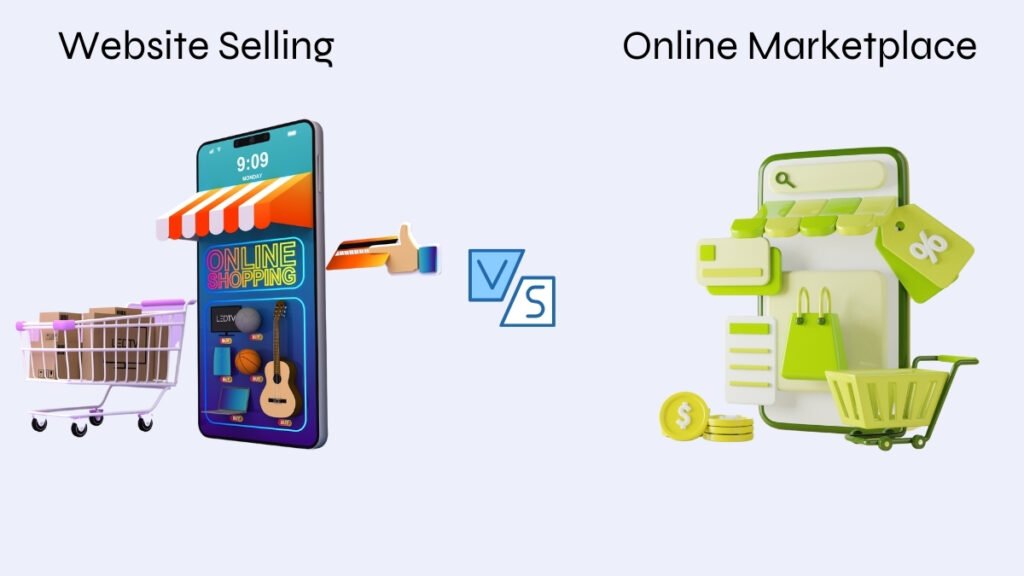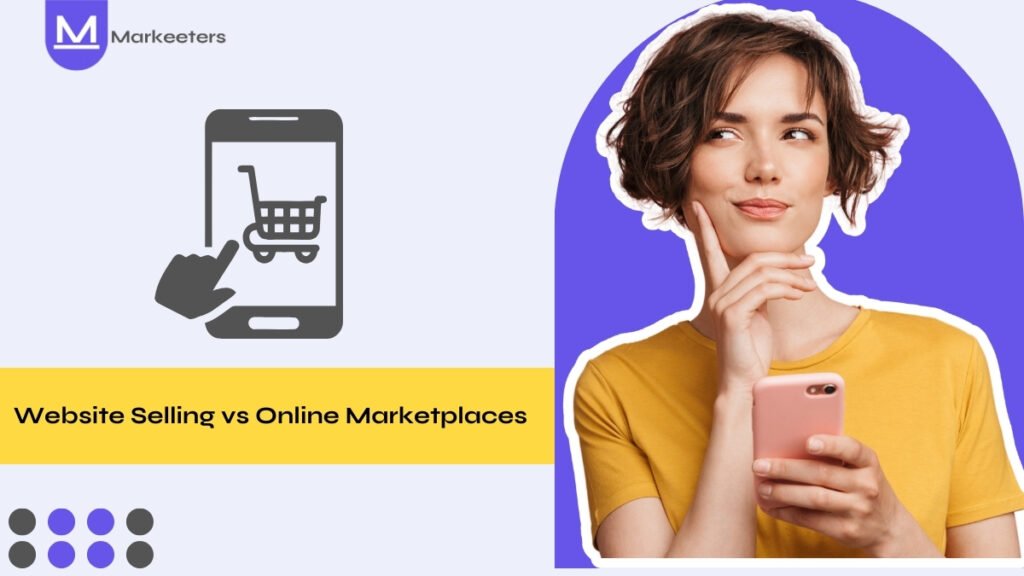Website Selling vs Online Marketplace: Which is Better for your Business? Let us explore the comparison with this detailed blog.
Selling goods online has many advantages for online retailers. They can reach a wider target audience and sell products around the clock. The importance of online shopping has grown so much that retailers cannot ignore it. But before you begin selling online, there are a few things to think about. The question of whether to build your own website or use an online marketplace is one of the most essential strategic decisions.
New sellers often assume that there is no difference between website selling and online marketplaces. In real terms, websites and markets are unique channel types with specific features of their own. Some retailers choose to use both in their omnichannel strategy. However, that might not be the best course of action, particularly if your store is short of personnel, supplies, or time. It might be exhausting for amateurs to manage two sales channels, and it can even prove to be unproductive.
In this blog, we explore the key differences between website selling and online marketplaces. Let’s begin!
What is a Website Selling?
Website selling refers to the process of selling products or services directly through a dedicated website or online store. In this way, a business creates and manages their own e-commerce store to sell their products, process transactions, and provide customer service. The website is fully owned by the company owner. The owner is responsible for maintaining inventory, shipping, and billing. As a result, it functions as a single-vendor platform. The transaction occurs between the two parties: the buyer and the seller.

Pros of Website Selling
Availability of Customer Insights
It is easier to track customer behavior on your website. You can track transaction history, average order value, amount of time spent on each page of your website, conversion pattern history, and other information. To put it simply, you can monitor the buying patterns of your customers, from researching to putting in the cart and checkout. You can also collect consumer data that aids in improving your buying selection and habits. You can increase the conversions overall.
Create Advertising Campaigns
Increased recall value and customer loyalty are two benefits when you establish your own website. You can create advertising campaigns accordingly. You can plan extensive activities such as reaching out to customers, implementing loyalty programs, running referral campaigns, collaborations, and more. It offers you several options to target your audience. You can receive leads from Facebook ads, Instagram targeting, and even Google ads.
Improved Authority and Control
You have complete control over your e-commerce website. Everything is under your control, including the appearance and feel, navigation, layout, design, and content. You manage your website even though it was created on an e-commerce platform. Your customer is aware that you exist. Customers visit your website because of your reputation and products. Everything goes smoothly for you. It is therefore entirely up to you whether you succeed or fail. Therefore, aim for quality to leave a “wow” impact on the customers’ minds when they arrive.
One-time Investment
Owning a website is a one-time investment that is split across several years. It is not necessary for you to share the margins with the market. As a result, you earn more money and receive a number of features that significantly improve your website’s security and safety.
Cons of Website Selling
Time-Consuming Marketing Techniques
Since you are the only one who has control of your website, it will be your duty to run marketing campaigns. You have to oversee the complete show, from keyword research to campaign creation, promotion, and execution. Additionally, you would need a team of committed and skilled employees for it.
Creating and Managing Budget
It goes without saying that because it is your website, you are responsible for paying to have it set up and maintained. There are also some operating expenses.
Read more:
| As of 2022, Online Marketplaces account for the largest share of online purchases worldwide. Retail e-commerce sales were estimated to exceed 5.7 trillion U.S. Dollars worldwide (Statista). |
What are Online Marketplaces?
Online marketplaces are digital platforms that facilitate the buying and selling of products and services between multiple third-party sellers and buyers. These platforms act as intermediaries, connecting sellers with a broader audience of potential customers. Simply put, a marketplace is a third-party online store where customers can buy products and services from a variety of sellers. Examples of online marketplaces are Amazon, eBay, and Flipkart.
The marketplace handles both the processing of the business transaction and its fulfillment. Marketplaces charge a particular amount of fees to do so.

Pros of Online Marketplaces
Take Advantage of your Marketplace’s Dependability
People make purchases at reputable marketplaces since they have a large customer base. There is traffic on the reputed marketplaces. Even if nobody knows you, customers will still buy your products. They depend on the marketplace and trust it.
Marketplace Manages SEO
Online marketplaces have solid SEO and SERP credibility for their product category sites. They outperform individual websites in terms of bringing more attention to your products. In simple terms, sellers do not have to spend a lot of their efforts to generate traffic.
Minimum Investment
Selling your products on a marketplace is cost-effective. A certain amount of money is required for website creation and maintenance. When you use a marketplace to sell your products, you only have to pay its fees. You do not have to worry about infrastructure and IT support. Marketplace takes care of that for you.
Simplify Shopping Experience
Online marketplaces have clear rules and policies covering every aspect, from purchase to shipping and cancellation. This reduces your headache, and you can focus on growing your business. It is easy for you to start doing business because marketplaces simplify the overall process for you.
Cons of Online Marketplace
Fierce Competition
The marketplace is full of a variety of businesses, just like you. Staying ahead of the competition becomes difficult. Marketplaces have marketing methods and even perform SEO for your business. However, it all depends on how much money you can spend to rank at the top. Marketplaces now provide “Sponsored Category” which allow users to pay to rank highly. Therefore, getting business will be difficult if your items don’t rank highly. There is no promise or security that the customer won’t go to your competitors, even if you pay.
Absence of Branding & Customer Acquisition
There is no better recall value and increased customer loyalty at the marketplace. It is possible that you will not be able to brand your website for a marketplace. You just continue to be one of the businesses, and your products are just one of the products. It is challenging to communicate the benefits of your products on marketplaces. You don’t have enough room to talk about yourself, which becomes a serious problem.
Website Selling vs Online Marketplaces: A Quick Review
| Aspect | Website Selling | Online Marketplaces |
|---|---|---|
| Control and Branding | More control over branding and presentation. | Limited control; follows marketplace design. |
| Customization | Highly customizable website design and UX. | Limited customization options. |
| Reach | Limited reach; depends on marketing efforts. | Wider reach with an existing customer base. |
| Traffic | Need to drive own traffic through marketing. | Marketplace generates traffic for products. |
| Flexibility | More flexibility in pricing and promotions. | Adhere to marketplace’s pricing structure. |
| Costs | Initial setup and maintenance costs. | Fees to the marketplace for transactions. |
| Competition | Competing with similar businesses online. | Direct competition within the marketplace. |
| Customer Trust | Building trust directly with the audience. | Using the marketplace’s reputation. |
| Payment Processing | Own payment gateway integration. | Marketplace-provided payment processing. |
| Feedback and Reviews | Platform-specific feedback and reviews. | Marketplace-driven feedback and reviews. |
| Customer Support | Direct responsibility for customer support. | Shared responsibility with the marketplace. |
| Scaling | Scalability depends on marketing efforts. | Easier scaling due to marketplace exposure. |
| Inventory Management | Full control over inventory management. | Adhering to marketplace’s inventory rules. |
| Data Ownership | Full ownership of customer data. | Limited access to customer data by the marketplace. |
| Brand Loyalty | Builds direct brand loyalty | Loyalty may be to the marketplace, not the seller. |
Learn more with Markeeters:
- What is a Fractional CMO? Role, Responsibilities, Benefits and More
- 10 Tips on How To Use Neuromarketing in Your Marketing Strategy
Website Selling vs Online Marketplaces: A Detailed Comparison

Website Selling vs Online Marketplaces: Cost
It is important to take into account the initial and ongoing costs associated with establishing and managing your business.
| Website Selling |
|---|
| Website owners are spared from monthly membership fees and commissions on each transaction. Instead, the price of keeping a website takes into account the cost of buying a domain name, using a website builder, and routine maintenance. So, by increasing sales, companies can raise their profit margins. An important thing to remember here is that website owners are also fully responsible for their own marketing and lead generation activities. |
| Online Marketplaces |
|---|
| Marketplaces often function on a commission-per-sale or membership fee basis for their suppliers. They are able to charge lower costs because they have a large number of sellers. Also, marketing and other activities rely on a marketplace customer base, which is why they have a very small budget. |
Website Selling vs Online Marketplaces: Brand Awareness
One of the marketing pillars that will establish the basis for several sales potential is brand awareness.
| Website Selling |
|---|
| If you have your own website, you have to think about getting traffic to it, bringing in new customers, and building brand authority. Do consumers feel comfortable submitting their card details? What are your rules for returns and refunds? Will you guarantee that the items are in appropriate condition and dispatch them on schedule? These are some of the concerns that influence a buying decision. Remember that it takes time for new brands to gain the confidence of consumers. |
| Online Marketplaces |
|---|
| The beauty of marketplaces is that consumers are used to the layout and workings of the site. To further reassure customers about their purchase, they will know how protected they are when it comes to payment, returns, shipping, and refunds. Retailers can benefit from the proven trust and brand awareness of prominent online marketplaces such as Amazon and eBay. |
Website Selling vs Online Marketplaces: Analytics
Analytics are important to understand customer behavior, their search preferences, and other aspects.
| Website Selling |
|---|
| When sellers have their own website, they have complete access to consumer data and analytics. This helps them customize marketing efforts and communicate with your existing customers. You can analyze past behavior and challenges. Brands that understand their customers can create useful contact lists and customize their customer care to better fit the needs of their target market. |
| Online Marketplaces |
|---|
| Marketplaces provide their sellers with very limited information on customer analytics. It is difficult to know your customers and analyze your competitors. Since everything is done through the marketplace, there is also a very minimal direct relationship with customers. Sellers can find relatively little past consumer data. |
Website Selling vs Online Marketplaces: Marketing
In order to build brand awareness, retain your customers, and get new ones, marketing plays an important.
| Website Selling |
|---|
| Independent website owners have greater control over how their products and brands are differentiated. Businesses use SEO, social media marketing, and more to promote their brand. Websites also provide an improved customized user experience. This helps in building personal and long-term relationships with your customers. |
| Online Marketplaces |
|---|
| It is typical to see different merchants selling the same things on marketplaces. For these items, there is no differentiation. As a result, consumers look at reviews and prices while shopping. There may be fewer opportunities to differentiate your products from the competition unless it is a niche market. However, retailers still need to account for the volume of traffic originating from searches for specific items. |
Website Selling vs Online Marketplace: Conclusion
We hope that this blog has been helpful in showing the key differences between website selling and online marketplaces. In the end, each seller is unique in terms of their demands and preferences. It may be useful to take a step back and consider which technique is more appropriate for your brand’s requirements. You have to take into account the resources and capabilities for development, setup, expenses, and control.
More resources for you:
- Google’s Gemini vs Open AI’s GPT-4: A Detailed Comparison
- Easyship vs Shippo: Best E-Commerce Shipping Solution (2024 Comparison)
FAQs
What is the difference between a website and an online marketplace?
Only your items will be listed on the website, and they will be categorized. When a sale is made on an e-commerce website, there are two parties involved: the buyer and the seller. A marketplace is an online retail site where many retailers offer their products.
Is a marketplace better than an e-commerce platform?
We suggest launching an e-commerce platform if you want to provide a more flexible buying and selling experience that lets customer and sellers bargain over conditions. On the other hand, you can establish a marketplace if you would like more control over the buying and selling procedure, including delivery and price.
What are the 3 types of online marketplaces?
– Consumer-to-consumer (C2C), sometimes called peer-to-peer (P2P)
– Business-to-business (B2B)
– Business-to-consumer (B2C)





